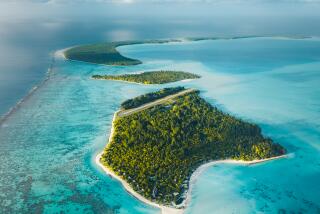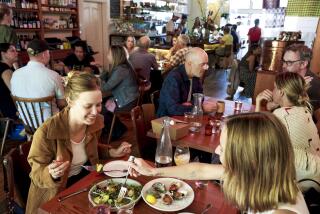Aitutaki: The Best and the Brightest Little Island
- Share via
AITUTAKI, Cook Islands — There’s a saying in the West that could easily apply to the little-known and largely unspoiled island/lagoon of Aitutaki: “Never ask a Cook Islander where he comes from. If he’s from Aitutaki, he’ll tell you. If not, don’t embarrass him.”
Everything is bigger and better on Aitutaki. I know. They told me so.
“But isn’t Rarotonga larger?” I asked. “Yes, but Aitutaki would be larger,” they carefully pointed out, “if you include the lagoon.”
“But your highest peak, Maungapu, is much lower than Rarotonga’s Te Atukuru,” I countered. “Who needs mountains?” they wondered. “For even Maungapu,” they claim, “was chopped off of Rarotonga’s Mt. Raemaru and brought back by victorious Aitutaki warriors.”
“Raemaru is surprisingly flat on top,” I had to agree.
“But what about animals? I see no dogs here.” I wondered aloud. “They were banned long ago,” I was told, “due to a widespread belief that dogs carried leprosy.”
Aitutaki is also the quietest and cleanest island, they claim.
Bragging Continues
“But what about food?” I questioned. “We have the best of that, too,” a fisherman bragged. “The lagoon is full of fish and pahua (clams).”
“The lagoon is also full of sea slugs. Do you eat those too?” I asked innocently as his upper lip curled toward his nose. “Ugh!” he laughed. “Only Rarotongans eat those.”
“And fruit?” I queried. “I haven’t seen any in the markets.” “Nobody buys fruit here,” I was told. “They just go to the bush or somebody’s farm and take it.”
Aitutaki has an unwritten law that any ripe fruit can be taken free. “Once the fruit is ripe it’s too delicate and too late to ship and to sell it,” he said.
Suspiciously, I asked again: “But what if a farmer sees you?” “He’ll probably come over to help you pick it,” he replied. Aitutakians are also the happiest and best-fed.
“And bread?” “I never take bread with me when I visit Aitutaki,” the ex-local said. Of course, Aitutakians also make the best bread, they maintain.
A women greeted us and asked, “Do you have any children?” Aitutakians have the most children. “No,” Sue and I answered, “not yet.” “Would you like one?” she nudged one of her youngest forward. Aitutakians are also the most generous.
Thinkers, Too
A young man named Neill Mitchell introduced himself to me. “My uncle was Sir Albert Henry” (the notorious premier who led them to independence). Aitutakians are also the leaders. Soon our discourse turned to philosophy, and as he quoted from the greats I couldn’t help thinking, Aitutakians are also the thinkers.
The conversation changed as a pretty young Maori wahine at the hotel table leaned over and casually asked, “How long were you on Rarotonga?” “Two weeks,” I replied. “Two weeks?” she exclaimed. “Why would you want to be there for two weeks? It’s so boring!” Aitutaki also has the best parties, she enthused.
“Is there anything that isn’t the biggest or the best on Aitutaki?” Surely they couldn’t have everything . “Mosquitoes,” came the answer. “Aitu has more mosquitoes.”
I finally gave up. Such is life in the Cooks.
A conversation like this could go on forever with native and non-native Aitutakians alike, and as one put it herself, “If he talks your ears off, he’s an Aitutakian.”
But why not? Aitutaki is everything it claims to be. Beautiful rolling hills rich in banana and citrus plantations cover the verdant interior. Tin-roof cottages and thatch-roof bungalows sit side by side in the shade of the spreading mango trees. Rust-red dirt roads cut through the inland tropical soil while white crushed coral roads shimmer on the island flanks near palm-lined sandy beaches.
And then there is the lagoon. Most of all, Aitutakians are proud of their lagoon. Rivaling even Bora Bora is the triangular reef-bound jewel that Aitutakians claim as their lagoon. Like a highly polished turquoise gem, it shimmers to meet you.
All Its Majesty
Only from the air can you see it in all its majesty. The minutely suspended particles give the water its famous color but it’s the emerald green, palm-studded motus (small islands) that give it its charm.
From the moment you arrive you’ll be bombarded with information about lagoon cruises and people asking you if you’ve seen the motus yet. If you’re a cheapskate like me, you may hesitate at first to spend the 18 New Zealand dollars per person for the boat cruise and picnic on a motu , but after a couple of days there you’ll realize it’s not a matter of choice, and nobody’s asking “if,” just “when?” Aitutaki has the best lagoon tour. You have to go.
Three boats run the tours and after inspecting each, my wife and I chose Capt. Takapuna’s. A native Aitutakian, he knows the reef as well as any man but his special pride is in making sure that we would have more fun on his boat than on any of the others.
It was an all-day trip, so breakfast was in order, but we needn’t worry about lunch. The boat left around 10 a.m. (nothing is punctual in the Cooks) and returned around 5 p.m., and what an unforgettable day we had.
About midway in the lagoon Capt. Takapuna anchored off some striking coral reefs in about 30 feet of water. While he was busy spearing fish and gathering clams for our lunchtime feast, our time was ours to swim and explore this undersea Garden of Eden.
At last, lunch was caught and we happily cast off to our destination of palm trees and white sands to play Robinson Crusoe on one of the many beautiful and uninhabited motus that dot the lagoon. (Altogether there are 15 islands in the Cook Island group and altogether there are 15 motus in the Aitutaki lagoon, a fact the locals won’t let you forget.)
The Meaning of Life
Again, the time was ours, to explore, to snorkel in clean, shallow blue-green water or simply to lie on the beach and contemplate the meaning of life. Until lunch was served.
It was all we could eat (and I ate all I could) of barbecued fish, clams marinated in lime juice, papayas, bananas, oranges and bread. And then it was back to the beach and the meaning of life again. Until alas, we returned regretfully, but full of memories.
Ah, their lagoon! Even the expatriate New Zealander at the airport office sympathetically shook his head when I asked about the charter flight to the island of Aitu. As his hand swept toward the horizon he replied, “There’s no lagoon over there like here.”
Aitutakians may be boasters but they love to listen, too, especially when one is asked that most important question of all, “How do you like Aitutaki?” As we started to answer the woman at the small airport (Aitutaki has the only airport with two runways in the Cooks, they informed us), the loud chattering instantly and uncomfortably died away as everyone leaned out to hear my words.
The Main Attraction
But like so many others I’ve met, I’m happy to say that their pride doesn’t blend with snobbishness; Aitutakians are also the friendliest. Watch them fling themselves out of doorways and nearly fall flat on their faces waving to you as you scooter by. There’s no other place like it. But then again, the people are the main attraction on all the Cook Islands.
But don’t just believe me, take it from a higher authority: The words of the Sunday morning preacher came down like gospel truth as he smiled from behind the high pulpit at us papaa (foreigners) who were given seats of honor in the front pews.
“You are very lucky to be here today,” he started, “for you are sitting in the first church built in the Cook Islands.” (Aitutaki was also the first to be Christianized.) “. . . (So) when you go home to your families,” he paused, “tell them you have been to Aitutaki.”
And then came the heart of his message, “(For) if you haven’t seen Aitutaki, you haven’t seen the Cook Islands.”
More to Read
Sign up for The Wild
We’ll help you find the best places to hike, bike and run, as well as the perfect silent spots for meditation and yoga.
You may occasionally receive promotional content from the Los Angeles Times.





